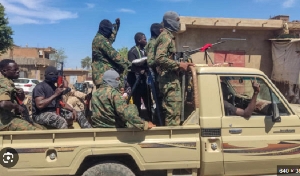- Home - News
- TWI News | TV
- Polls
- Year In Review
- News Archive
- Crime & Punishment
- Politics
- Regional
- Editorial
- Health
- Ghanaians Abroad
- Tabloid
- Africa
- Religion
- Election 2020
- Coronavirus
- News Videos | TV
- Photo Archives
- News Headlines
- Press Release
General News of Wednesday, 1 October 2003
Source: GNA
Judiciary failed to defend Constitution against coups - Witness
Accra, Oct. 1, GNA - Mr. Mohammed Sanni Farl, former PNP Member of Parliament for Ayawaso on Wednesday took a swipe at Ghana's Judiciary and said it failed the country for its inability to defend the Constitution against coup d'etats.
He said whenever there was a coup the Judiciary was left untouched, hence members appeared to care less and behaved as if nothing had happened to the very Constitution that established them.
Mr. Farl who appeared before the National Reconciliation Commission (NRC) said the Judiciary should change its attitude and stand up for the civilians rather than kowtow to military regimes that overthrew the constitution.
He said however badly a government performed, it did not give any group the mandate to take up arms to overthrow the government, adding that this must be condemned as it was an attack on the institution of democracy itself.
Mr. Farl said Parliament, the most important institution of any democracy, was most often destroyed during coups making it impossible for it to stand on its feet.
He said parliament must be given all the support it needed to help it to function, saying there was no need to raise a hue and cry over the proper equipment of Parliament with appropriate remunerations for Parliamentarians for the effective discharge of their duties.
Similarly there should be proper remunerations for the Executive, adding that for the 27 months that the PNP was in power, the President, Ministers and Deputy Ministers lived on allowances rather than salaries. The salary for the President was being worked upon when the December 31 1981 coup occurred.
Touching on the Constitution, Mr. Farl said it has nothing good to offer and there was the need to change it entirely for the good of the country adding "The people own the constitution and not vice-versa''. Mr. Farl who was giving evidence at the NRC said he became the People's National Party Member of Parliament in 1979 adding during the December 31, 1981 coup, all MPs were asked to report at the nearest police station.
He said he reported at the Cantonments Police Station with other MPs only for soldiers to arrest them and sent to the Nsawam Medium Security Prisons with more arrests being made as the days rolled by. The Witness said six of them slept in a cubicle with their latrine pans adding that three weeks later Mr. Abuah, then MP for Sekondi died because he was ill but his cell door was locked and the key taken away hence the door could not be opened.
He said they lived in fear adding that in the mornings the guards would assemble them insult and humiliate them.
"We were later taken in batches to the National Investigations Committee (NIC) for interrogation and some of us were subjected to beatings."
Mr. Farl said on June 28, 1982, he was taken back to the NIC where he was informed that he had been released.
Instead of going home the Prison Officer took him back to the prisons where he spent six more months.
He said he was released on a general amnesty on January 3, 1983 but realised that soldiers had ill-treated members of his family and his property was looted.
Mr. Farl said similar things happened to some of his colleagues resulting in their early death.
Dr Tetteh said after his arrest, his wife, who was five-months pregnant and his mother, then 80, were also arrested and locked up in police cells.
He said he was later made the paramount chief of the Ningo Traditional Area, but he was arrested two days later in the night, after a durbar, for offering advice on improving security to then Acting Prime Minister, Mr Kwesi Lamptey.
He said the Area Police Commander misconstrued his advice as reporting to the Government that he was not doing his work well. Dr Tetteh said he was sent to the Community Two Police Station, and then to Nsawam, but expressed his gratefulness to the then Progress Party for treating him as a chief and according him the necessary respect.
He said he was released after eight months on the appeal of his traditional authority, but a faction of the Traditional Authority had installed a businessman.
Dr Tetteh said he contested the case in court, and both the Justices Randolf Cliff and Sarkodie- Addo ruled in his favour, but he was however not able to enforce the ruling.
He said he was later arrested together with the Secretary of the Traditional Council to keep the peace in the Ningo Township. One Colonel Habadah made him sign a document whose contents he did not sees and warned him not to "talk of chieftaincy again", before he was released.
According to Dr Tetteh he was inspired by termites making anthills in the river to manufacture a special kind of brick, which was acclaimed internationally.
He said following the success of his unique technology in brick production, he put up more than 100 unit house at Dansoman Exhibition, and the German government agreed to give him credit for the machines and chemicals for the brick production.
However, the government delegation made up of Dr William Sam, Mr Acquah Sam, and Mr D D Obiri, the Principal Secretary who were scheduled to meet the German counterparts could not be present at the ceremony at an exhibition in Germany at which the credit agreement would be signed because of Giwa's coup on June 19 1983.
The credit agreement could not be signed, because the delegation which later arrived in Germany explained to the German counterparts that the then Head of State "would not like any Ghanaian to have so much money to influence the Ghana Armed Forces to destabilise the Government."
Dr Tetteh said after personal consultation with the Head of State Flt Lt J J Rawlings, Rawlings gave him one Major Wallace Gbedemah, who set up the Unibrik Co-ordinating Committee, but two weeks later Yoomo Bi Akrong Nabi, and one Captain Binka came to him and asked him to approach Chairman Rawlings to drop Major Gbedemah for Major Courage Quashigah, because Gbedemah had not taken part in the coup that brought Rawlings to power.
Another Witness, Nana Adom Amapadu Kyidomhene of Anyinam, told the Commission of sustaining severe injuries at the hands of the Police who were on Legon campus to quell a student demonstration. He said he was subjected to severe beating, and he suffered a fracture in the process.
He was consequently hospitalised, but the Police took no interest in caring for him, neither the Ghana Education Service from where he was on study leave.
Nana Amapdu said, his use of a walking stick often led to a revelation of his seeming involvement in student riots, and after a number of secondary schools had turned him down for his national service, the Osino Secondary School which later accepted him asked him to leave.
He said the injuries he suffered also made it impossible and the herbal treatment he underwent affected his memory. He said his general health affected his studies at the University and that he had been referred a number of time in his Law School exams. The Commissioners commended Nana Ampadu on his efforts to further his education, but advised him to seek proper medical attention before his condition got worse.










